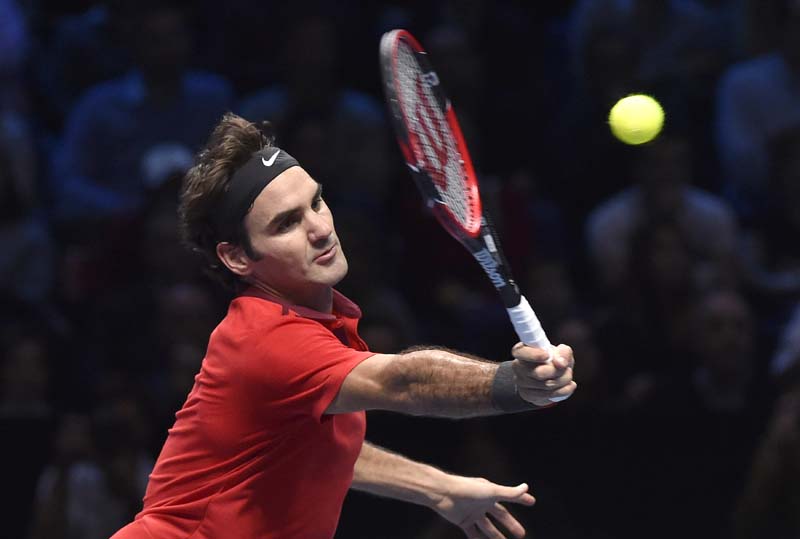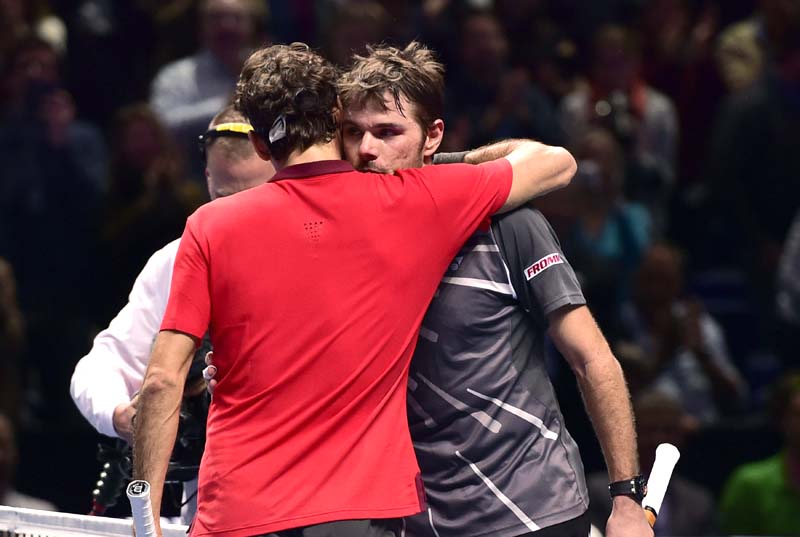Opinion
FootballWhy Roger Federer should have played London final
:focal(155x147:157x145)/origin-imgresizer.eurosport.com/2015/03/26/1443747-30871907-310-310.jpg)
Published 05/05/2015 at 13:19 GMT
Roger Federer's late withdrawal from the final of the ATP World Tour Finals was a hugely uncomfortable spectacle that would be deemed catastrophic in any sport other than tennis. The Swiss veteran pulled out less than an hour before his match against Novak Djokovic at a packed O2 Arena, citing... well, what exactly? Here's what Federer told a disappointed crowd:
Eurosport
Image credit: Eurosport
"I'm sorry I'm not fit to play. I hope you understand. I wanted to come out personally and explain. I did everything I could. I took pain-killers, had rest until the very end, but I just cannot compete at this level with Novak. At my age it would've been a risk. It's not that much of a surprise. This back spasm, whatever it might be, it's just not a fun thing to have during the day. It's just uncomfortable. But I'm positive and I'm hopeful that it's going to go away soon."
Like many (or even most) sportsmen, Federer has been playing through a degree of pain - and playing extremely well. On Saturday night he came from match point down to beat his countryman Stan Wawrinka in the semi-final. That win took him to 18 wins from 19 singles matches since the US Open.
Last week, after demolishing Andy Murray 6-0 6-1, observers hailed the 33-year-old for defying Father Time to produce some of the best tennis of his career. So although we cannot doubt that he has been carrying an injury, and while it's true he aggravated his back against Wawrinka, the effect on his performances has been imperceptible.

Here's the really damning bit: "I just cannot compete at this level with Novak."
Federer went on to say he was not "match fit" - unable to play to the standard he wanted. This at the year's most prestigious non-Grand Slam event, from which he will take back to Switzerland for reaching this year's final.
He pulled out not because he was too injured to play, but because (he thought) he was too injured to win.
Now Federer is not alone in this. Tennis players frequently withdraw from matches if they do not feel 100 per cent, a practice that goes largely unnoticed at low-profile tour events. But at the season-ending extravaganza? It's simply unconscionable.
Of course, it was not just fear of a pasting that informed his decision. Switzerland face France in the Davis Cup final this weekend - a chance for Federer to win the 'World Cup of tennis' for the first time.
Despite talk of a bust-up with Wawrinka, is there any doubt that he will be fit and firing when he laces up against Tsonga, Monfils and company in Lille? Of course not.
And how will fans who shelled out £60 and upwards to attend the London final feel if he does indeed lift the trophy? You could forgive them a few shouts of 'Allez Les Bleus' at their televisions this weekend.

The situation contrasts starkly with the bizarre controversy surrounding the England footballer Raheem Sterling.
Sterling was widely criticised after manager Roy Hodgson revealed he'd said he was a bit tired in training. Hodgson picked Adam Lallana to start against Estonia, though Sterling came on as a substitute.
For all the muck thrown at him, all Sterling did was mention a degree of fatigue in a private conversation with his manager - a conversation that the manager, for reasons best known to himself, chose to make public.
Unlike Federer, Sterling did not refuse point blank to play. In fact, he did play.
Even if he hadn't played, Sterling's absence would not have affected the game. Federer pulled out, and the match did not happen. The final flourish of the ATP tennis season - gone, just like that.
Sterling did not wait until half an hour before the match before telling Hodgson he was tired. Federer delayed his decision until the O2 Arena was full, then offered a weak excuse, leaving thousands of fans in attendance and millions on TV disappointed.
Very often, sport is about playing through pain. It's about the fast bowler whose feet bleed every night due to his exertions, and the Tour de France racer who overcomes weeks of inhuman punishment. It's about the motorcyclist who breaks his leg, then gets back on his bike to race the next week, and the footballer who tries to defy a torn hamstring to play in the Champions League final.
People are too quick to infuse sport with moral judgements. Diving in football, refusing to walk in cricket, team orders in F1, even failing to respect the haka in rugby. All are hysterically decried as outrageous demonstrations of ethical bankruptcy.
But it's only a game. And in a game, the only real crime is failing to give your all.
Federer is rightly venerated as a towering sporting figure of our age. He is an extraordinary ambassador for tennis, and a sportsman whose combination of elegance and flamboyance puts him in the company of stars like Brian Lara and Zinedine Zidane among the all-time greats.
He is man who maintains skyscraping standards on and off the court.
On Sunday night he could not live up to those standards, and tennis was the loser.
- - -
Editor's note: This blog has been amended to tone down some criticism of Roger Federer.
I strongly believe sportspepole have a duty to perform whenever possible. Even when less than 100% fit, even if they believe their chances of victory are slim to non-existent, and even if they have a Davis Cup final the following week - especially when they are standing in a full stadium of fans desperate to see them play.
Although Federer's own comments suggested he could have played (although perhaps not at a high level), without knowing the full nature of his injury it was unfair to accuse him of any moral failing, especially as his career record shows he is not a player who takes withdrawal from a match lightly.
- - -
Scan me
Related Topics
Share this article
Advertisement
Advertisement